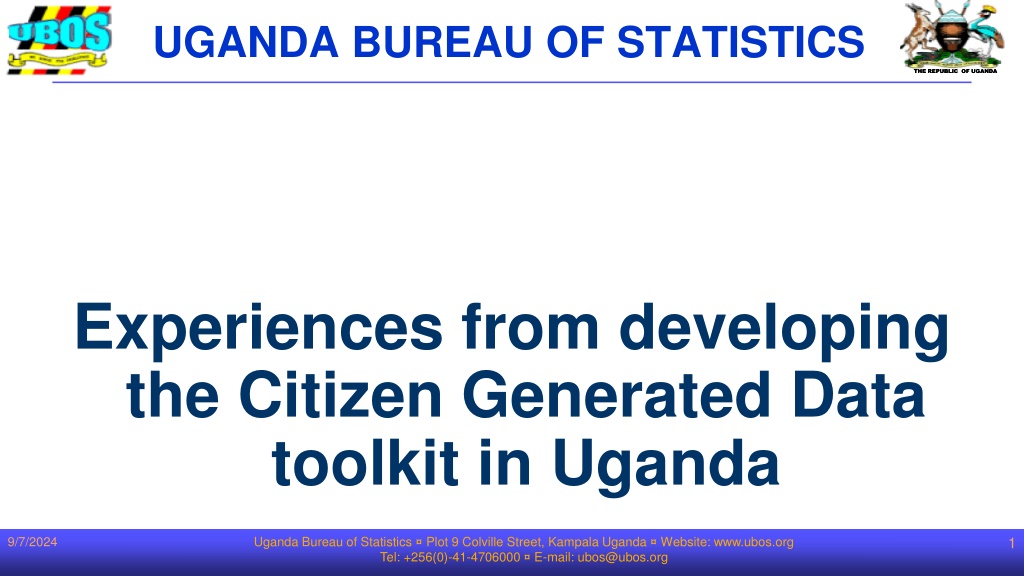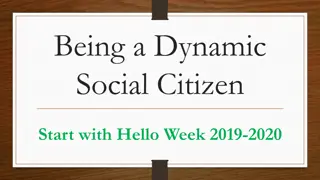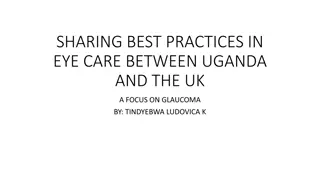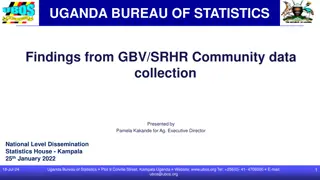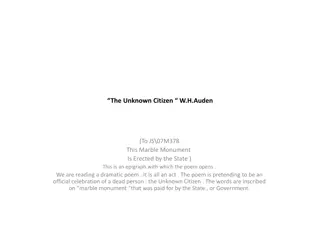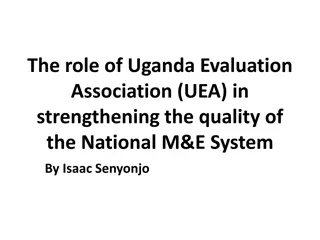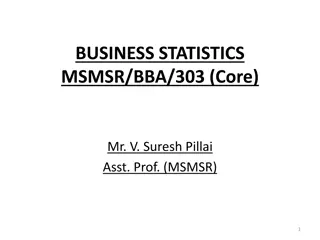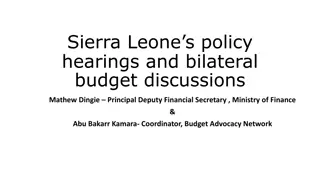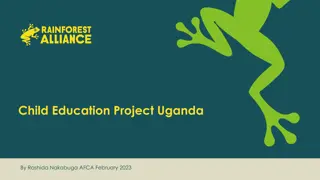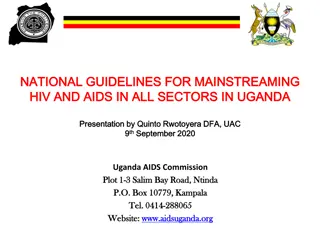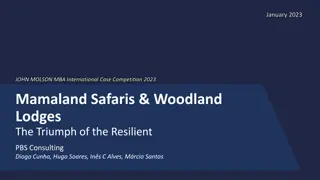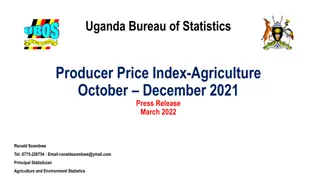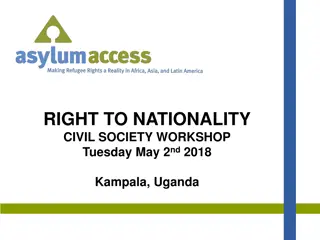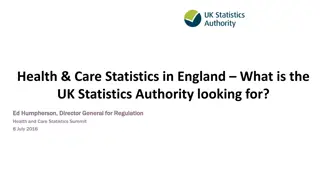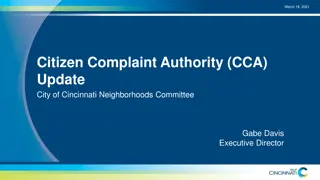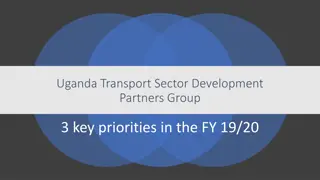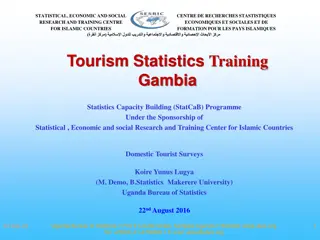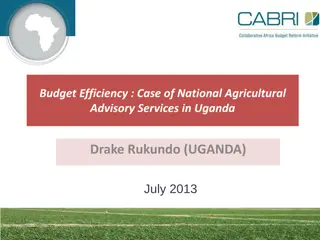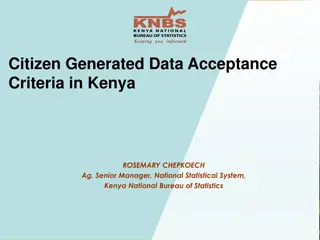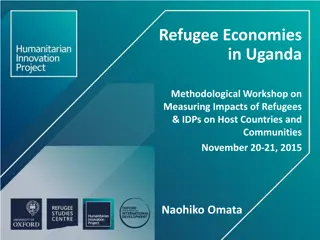Enhancing National Statistics Through Citizen Generated Data in Uganda
Uganda's adoption of Citizen Generated Data (CGD) for informing policy-making and programming on gender equality and women's empowerment is highlighted. The Uganda Bureau of Statistics collaborated with various entities to develop the CGD Toolkit, emphasizing the importance of non-traditional data sources and community involvement in data collection processes.
Download Presentation

Please find below an Image/Link to download the presentation.
The content on the website is provided AS IS for your information and personal use only. It may not be sold, licensed, or shared on other websites without obtaining consent from the author. Download presentation by click this link. If you encounter any issues during the download, it is possible that the publisher has removed the file from their server.
E N D
Presentation Transcript
UGANDA BUREAU OF STATISTICS THE REPUBLIC OF UGANDA THE REPUBLIC OF UGANDA Experiences from developing the Citizen Generated Data toolkit in Uganda 1 9/7/2024 Uganda Bureau of Statistics Plot 9 Colville Street, Kampala Uganda Website: www.ubos.org Tel: +256(0)-41-4706000 E-mail: ubos@ubos.org
Outline THE REPUBLIC OF UGANDA THE REPUBLIC OF UGANDA Introduction to CGD in Uganda The CGD Toolkit Advantages, Limitations Data Collection Process Benefits Next Steps, Conclusion 2 9/7/2024 Uganda Bureau of Statistics Plot 9 Colville Street, Kampala Uganda Website: www.ubos.org Tel: +256(0)-41-4706000 E-mail: ubos@ubos.org
Introduction to CGD in Uganda THE REPUBLIC OF UGANDA THE REPUBLIC OF UGANDA The Legal and Policy frameworks governing statistics fully support the need for, and the role of, non-traditional data sources, including Citizen Generated Data (CGD), in bolstering national statistics. The Uganda Bureau of Statistics (UBOS) Act (1998), defines the National Statistical System (NSS) as: Includes all agencies in Uganda, whether Government or not; under any enactment or otherwise; responsible for gathering statistical data through either surveys or administrative action. 3 9/7/2024 Uganda Bureau of Statistics Plot 9 Colville Street, Kampala Uganda Website: www.ubos.org Tel: +256(0)-41-4706000 E-mail: ubos@ubos.org
Introduction THE REPUBLIC OF UGANDA THE REPUBLIC OF UGANDA Uganda adopted the UN Resolution on the need to advance generation and use of complementary data Citizen Generate Data , to inform policymaking and programming on SDG 5 Gender Equality and Women s Empowerment (GEWE). With support from UN Women, Uganda developed a Citizen Generated Data toolkit in January 2021. 4 9/7/2024 Uganda Bureau of Statistics Plot 9 Colville Street, Kampala Uganda Website: www.ubos.org Tel: +256(0)-41-4706000 E-mail: ubos@ubos.org
Introduction.. THE REPUBLIC OF UGANDA THE REPUBLIC OF UGANDA Citizen Generated Data (CGD), are datathat people or organizations produce to monitor, demand directly or drive change on issues that affect them (L mmerhirt 2018a). This data is directly collected from individual citizens, groups of persons in communities under given programs, and projects, which in this context are gender related.
The CGD Toolkit THE REPUBLIC OF UGANDA THE REPUBLIC OF UGANDA The CGD Toolkit was developed in a participatory manner with Government Ministries, Departments, Agencies (MDAs), Local Governments (LGs), Civil Society Organisations (CSOs) and the Private Sector. It provides basic guidelines for producers of non-traditional source data such as the Civil Society Organizations (CSOs) and Private Sector Institutions implementing GEWE related Programmes. It builds on current data compilation practices of this fraternity inquiry that preceded the development of this Toolkit. 6 9/7/2024 Uganda Bureau of Statistics Plot 9 Colville Street, Kampala Uganda Website: www.ubos.org Tel: +256(0)-41-4706000 E-mail: ubos@ubos.org
The CGD Toolkit THE REPUBLIC OF UGANDA THE REPUBLIC OF UGANDA Users of this Toolkit will be able to systematically compile reliable data to support own evidence-based decision- making, monitoring and evaluation, and, reporting progress of their interventions. The Toolkit provides acceptable and easy steps to follow in order to produce CGD that can be assessed for compliance against Uganda Standards for data quality before UBOS pronounces them as official. 7 9/7/2024 Uganda Bureau of Statistics Plot 9 Colville Street, Kampala Uganda Website: www.ubos.org Tel: +256(0)-41-4706000 E-mail: ubos@ubos.org
The CGD Toolkit THE REPUBLIC OF UGANDA THE REPUBLIC OF UGANDA The Toolkit is consistent with the UN Women East and South African Regional Office (ESARO) Methodological Guidelines for collection and use of CGD for reporting SDG 5 and gender specific indicators in other SDGs (2019). It is also consistent with the African Charter on Statistics, the Fundamental Principles of Official Statistics, the UN Data Quality Assessment Framework (UNDQAF), the Balance of Payments guide, Qualitative data Marker Standard and, Monitoring and Evaluation frameworks, among others. This Ugandan oriented CGD Toolkit underpins local practices and examples. 8 9/7/2024 Uganda Bureau of Statistics Plot 9 Colville Street, Kampala Uganda Website: www.ubos.org Tel: +256(0)-41-4706000 E-mail: ubos@ubos.org
Sources of CGD THE REPUBLIC OF UGANDA THE REPUBLIC OF UGANDA Citizen Report Card (CRC) Short Message Service (SMS) Phone calls (voice messages) Emails Programme reports Qualitative Studies etc.
Attributes of CGD THE REPUBLIC OF UGANDA THE REPUBLIC OF UGANDA Traditional Approaches A wider data collection exercise can be launched to investigate and also assess the extent of the problem More information may be required during data analysis and report preparation Data based on periodicity of survey or census Feedback to localities may not happen. The emphasis is on generalization Data Collection CGD Approach Captures and reports events and disasters, including poor service delivery in real time Provides additional information to explain the findings of surveys and censuses Provides real information Feedback to the citizens is required to sustain the reporting time data and 10 9/7/2024 Uganda Bureau of Statistics Plot 9 Colville Street, Kampala Uganda Website: www.ubos.org Tel: +256(0)-41-4706000 E-mail: ubos@ubos.org
Attributes. THE REPUBLIC OF UGANDA THE REPUBLIC OF UGANDA CGD, therefore, has the potential to complement, validate and enhance official statistics, by among others; Filling data gaps not addressed by the traditional data collection methods; Easing the extension of humanitarian support to the affected households and communities; Providing for continuous compilation of data, offering technical assistance to the reporters to ensure quality and consistency of information; 9/7/2024 Uganda Bureau of Statistics Plot 9 Colville Street, Kampala Uganda Website: www.ubos.org Tel: +256(0)-41-4706000 E-mail: ubos@ubos.org 11
Attributes. THE REPUBLIC OF UGANDA THE REPUBLIC OF UGANDA better Explaining, understanding of the situation; enriching or disproving findings for Ensuring that the data used to monitor the SDGs includes special interest groups; and, Enhancing valuable accountability and advocacy for citizens. 12 9/7/2024 Uganda Bureau of Statistics Plot 9 Colville Street, Kampala Uganda Website: www.ubos.org Tel: +256(0)-41-4706000 E-mail: ubos@ubos.org
Advantages THE REPUBLIC OF UGANDA THE REPUBLIC OF UGANDA CGD is versatile and presents citizen voices from communities and interest groups CGD compiles gender related data majorly through community engagements (Focus Group Discussions (FGDs), self-administered questionnaires etc. facilitate quick means of sending and receiving information, they are faster response mechanisms, and enable engagement of numerous community members making it easy to collect and validate the information at that level.
Limitations THE REPUBLIC OF UGANDA THE REPUBLIC OF UGANDA Technology intensive hence costly Limited access, penetration and unreliable connectivity Only few people are engaged due to limited ICT knowledge, skills and innovation capacity Risks of Cyber Crimes Time consuming during data collection, data analysis and reporting
Data collection Process - CGD Approaches THE REPUBLIC OF UGANDA THE REPUBLIC OF UGANDA Focus Group Discussions New approaches Social Media Crowd sourcing Data scrapping Short Message Services Key Informant Interviews Observations 15 9/7/2024 Uganda Bureau of Statistics Plot 9 Colville Street, Kampala Uganda Website: www.ubos.org Tel: +256(0)-41-4706000 E-mail: ubos@ubos.org
Data collection Process THE REPUBLIC OF UGANDA THE REPUBLIC OF UGANDA With guidance from the Gender Responsive Data Value Chain, the data collection process is taken through the following; Collection Production Publication Uptake and Use Impact Quality Assurance Management and M&E are paramount.
Benefits THE REPUBLIC OF UGANDA THE REPUBLIC OF UGANDA Institutionalization of CSOs in the NSS: by creating coordination mechanisms, metadata frameworks, human resource capacity building, consensus on SDG targets and indicators to report, and frequency and intra collaboration strategies. agreeing on common b) Enhancing skills and competencies of CGD data compilation: by agreeing on structuring, tools, and processes for systematic collection, processing, analysis, reporting, and disseminating information. 17 9/7/2024 Uganda Bureau of Statistics Plot 9 Colville Street, Kampala Uganda Website: www.ubos.org Tel: +256(0)-41-4706000 E-mail: ubos@ubos.org
Benefits THE REPUBLIC OF UGANDA THE REPUBLIC OF UGANDA c) Increasing the availability of quality CGD: By developing a common CGD, gender metadata dictionary and standards, and agreeing on data management policies across CSOs and the respective private sector entities. d) Raising the public profile for CGD as a reliable source: by developing an inclusive CSO data advocacy strategy. 18 9/7/2024 Uganda Bureau of Statistics Plot 9 Colville Street, Kampala Uganda Website: www.ubos.org Tel: +256(0)-41-4706000 E-mail: ubos@ubos.org
Next Steps THE REPUBLIC OF UGANDA THE REPUBLIC OF UGANDA Mainstreaming CGD in the Legal Framework Transforming CGD into official statistics Instituting Governance Structures for CGD Strengthening capacity for CGD production 19 9/7/2024 Uganda Bureau of Statistics Plot 9 Colville Street, Kampala Uganda Website: www.ubos.org Tel: +256(0)-41-4706000 E-mail: ubos@ubos.org
Conclusion THE REPUBLIC OF UGANDA THE REPUBLIC OF UGANDA The toolkit provides a standard approach that current and potential CGD producers should adopt to compile reliable, usable and accessible data. More so, the need to address aspiration of the Sustainable Development Agenda 2030 of "leaving no one behind" makes it incumbent for potential data producers to ensure that the voices of citizens especially the marginalized groups and individuals are embraced and elaborated. 20 9/7/2024 Uganda Bureau of Statistics Plot 9 Colville Street, Kampala Uganda Website: www.ubos.org Tel: +256(0)-41-4706000 E-mail: ubos@ubos.org
Conclusion THE REPUBLIC OF UGANDA THE REPUBLIC OF UGANDA All non-traditional data producers should comply, as appropriate, with the provisions of this toolkit, the Statistical Standards referenced and in print as well as the web-based publications, they prepare for users. 21 9/7/2024 Uganda Bureau of Statistics Plot 9 Colville Street, Kampala Uganda Website: www.ubos.org Tel: +256(0)-41-4706000 E-mail: ubos@ubos.org
Conclusion THE REPUBLIC OF UGANDA THE REPUBLIC OF UGANDA Appreciation to all CSOs, Private Sector Institutions, and Government for embracing this initiative. Special appreciation to UN Women 22 9/7/2024 Uganda Bureau of Statistics Plot 9 Colville Street, Kampala Uganda Website: www.ubos.org Tel: +256(0)-41-4706000 E-mail: ubos@ubos.org
THE REPUBLIC OF UGANDA THE REPUBLIC OF UGANDA Thank You 23 9/7/2024 Uganda Bureau of Statistics Plot 9 Colville Street, Kampala Uganda Website: www.ubos.org Tel: +256(0)-41-4706000 E-mail: ubos@ubos.org
